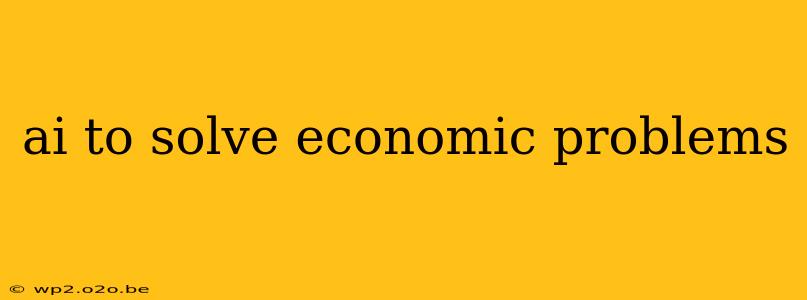The global economy faces complex challenges – from income inequality and inflation to climate change and resource scarcity. Traditional economic models often struggle to keep pace with these dynamic shifts. However, the rise of artificial intelligence (AI) offers a powerful new set of tools to analyze vast datasets, identify patterns, and predict future trends, potentially revolutionizing how we approach and solve these economic problems.
AI's Potential in Economic Modeling and Prediction
One of the most significant applications of AI in economics is its ability to enhance predictive modeling. Traditional econometric models often rely on simplifying assumptions that may not accurately reflect real-world complexities. AI, particularly machine learning algorithms, can process significantly larger and more varied datasets, capturing nuanced relationships and non-linear patterns that would be missed by traditional methods. This leads to more accurate forecasts in areas such as:
-
Inflation Prediction: AI can analyze a wider range of data points, including social media sentiment, commodity prices, and supply chain disruptions, to provide more accurate inflation forecasts, helping central banks make informed monetary policy decisions.
-
Financial Market Forecasting: AI-powered algorithms can analyze market trends, news sentiment, and company performance to predict stock prices and other financial assets with potentially greater accuracy than traditional methods. This can assist investors in making better-informed decisions and mitigating risks.
-
Economic Growth Prediction: By analyzing macroeconomic indicators, demographic trends, and technological advancements, AI can contribute to more accurate forecasts of national and global economic growth, aiding policymakers in developing effective strategies for sustainable development.
Addressing Specific Economic Challenges with AI
Beyond prediction, AI offers solutions to specific economic problems:
-
Combating Income Inequality: AI can analyze income data, education levels, and employment opportunities to identify factors contributing to inequality. This can inform the development of targeted policies aimed at reducing the gap between the rich and the poor. Furthermore, AI-powered tools can help optimize social safety net programs to ensure they reach those who need them most efficiently.
-
Optimizing Resource Allocation: AI can optimize resource allocation in various sectors, from agriculture and energy to transportation and healthcare. By analyzing supply and demand patterns, AI can help improve efficiency, reduce waste, and ensure resources are utilized effectively. This is especially crucial in tackling climate change and promoting sustainable development.
-
Improving Financial Inclusion: AI-powered lending platforms can assess creditworthiness more accurately and efficiently, potentially extending financial services to underserved populations. This can help boost economic activity and reduce poverty in developing economies.
The Challenges and Ethical Considerations
Despite its potential, the application of AI in economics also presents several challenges:
-
Data Bias: AI models are only as good as the data they are trained on. Biased data can lead to inaccurate predictions and reinforce existing inequalities. Careful data curation and bias mitigation techniques are essential.
-
Transparency and Explainability: Many AI algorithms, particularly deep learning models, are "black boxes," making it difficult to understand how they arrive at their predictions. This lack of transparency can hinder trust and acceptance, particularly among policymakers. Research into explainable AI (XAI) is crucial to address this challenge.
-
Job Displacement: The automation potential of AI raises concerns about job displacement in various sectors. Careful planning and retraining initiatives are needed to mitigate this risk.
The Future of AI in Economics
AI is not a panacea for all economic problems, but it represents a powerful new tool with the potential to significantly improve our understanding of the economy and inform more effective policymaking. Addressing the challenges associated with AI's application requires collaboration between economists, computer scientists, policymakers, and the public to ensure its responsible and beneficial implementation. The future of economic problem-solving likely lies in a synergistic approach combining human expertise with the analytical power of AI.

